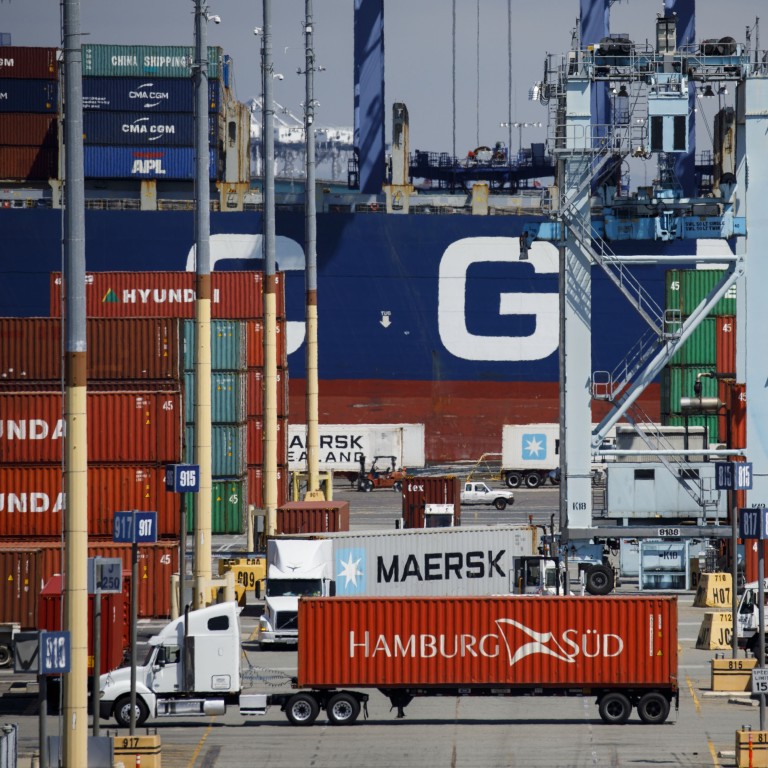
Exclusive | Global recession less likely thanks to loosening monetary policy, Credit Suisse CIO says
- Further escalation of trade war, higher oil prices could upset outlook, according to John Woods, CIO Asia-Pacific
- Credit Suisse sees less than 15 per cent chance of recession in 2020
Fears that an escalating trade war between the United States and China may push the global economy into a recession in 2020 are rising, but that outcome is far from a certainty, according to Credit Suisse.
Loosening monetary policy by central banks and the likelihood that the US Federal Reserve will cut rates this summer have “pushed back” the possibility of a severe economic downturn, said John Woods, Credit Suisse’s chief investment officer for Asia-Pacific.
The bank does not expect a recession this year and only sees a modest chance – 10 per cent to 15 per cent – of a global recession in 2020, he said.
“If we were to see the trade dispute intensify and deteriorate, the weakness in the global industrial production cycle would clearly intensify,” Woods said. “I think that would start to transmit some quite concerning signals around the global economy.
“If we saw a policy misstep by central banks, particularly the Fed, in their decision not to loosen, I think that would obviously cause some recessionary fears to increase as well.”
If oil prices were head upwards because of concerns about supply, “that would represent something of an unholy mix of risk factors that could upset our global outlook,” he said.
Does Trump want to fence off Wall Street from Chinese firms?
US President Donald Trump has threatened to place 25 per cent tariffs on US$300 billion of Chinese imports as soon as July, after adding duties on nearly half of all Chinese-made products last year. The latest proposed list includes footwear, flat-panel televisions and other items that would more directly affect the US consumer.
At the same time, tensions are rising in the Middle East after several tankers were attacked in the Gulf of Oman, and Iran is moving closer to breaching a key provision of a 2015 agreement to stop its efforts to develop a nuclear weapon, which Trump pulled out of last year. The US has said it would send an additional 1,000 troops to the Middle East.
Woods said that Credit Suisse’s base case is that there will be a temporary escalation of trade tensions, but a resolution between the world’s two biggest economies could be reached as soon as August.
On Tuesday, US President Donald Trump tweeted that he planned to have an “extended meeting” with his Chinese counterpart, Xi Jinping, at the G20 Summit in Osaka, Japan, next week.
Fitch Ratings said on Wednesday that it does not expect levies will be added to a further US$300 billion of Chinese imports, but the “peak impact of US tariffs probably lies ahead.”
The credit rating agency noted that an increase to 25 per cent on some US$200 billion of Chinese-made products had only recently come into effect.
Oil tanker attacks: did Iran’s ties with China just go up in smoke?
The rise in tensions between the US and China – and the fear of the affect of tariffs by the US and retaliatory actions by China lasting for an extended period – have cause several analysts and economists to indicate the likelihood of recession next year is much higher.
Morgan Stanley recently said that a global recession could happen within nine months if the trade war intensifies and lasts for an extended period. On Monday, JP Morgan pegged the likelihood of a recession in the US at 45 per cent.
“We are not in the camp that believes recession is imminent,” Woods said. “We believe in the underlying growth story. We do feel that the global industrial production cycle will actually tick higher in the months and quarters ahead and as a consequence of that was still reasonably positive towards risk. But again, in a selective way.”
At the same time, Woods said that he is not as bullish as some in the markets in the belief that the Fed will cut rates three-and-a-half times this years. He expects one cut over the course of the summer.
“I think that sends a powerful signal that the Fed is perhaps not ahead of the curve, but on the curve as it relates to growth and the need for accommodative policy,” Woods said.
Maker of bowling shoes, bags struggles to leave China amid tariffs
The Fed signalled on Thursday that it could cut interest rates later this year.
Of the 17 participants on the Federal Open Market Committee at its June meeting, seven indicated they expect two rate cuts by the end of the year, according to the latest projections released on Thursday. In March, no Fed policymakers expected a rate cut this year.
Woods said Credit Suisse was “moderately reducing risk” in its portfolio and had moved to an underweight position on emerging equities. He said the bank had maintained an overweight position on US equities.
“We’re still positive equities, but we’ve tilted more towards developed markets than emerging markets,” he said. “Within fixed income, now we have a preference for credit. We would rather express our risk appetite through high-yield and investment-grade credit rather than naked equity exposure.”
Woods said there is a preference right now, in terms of asset allocation in Asia, for “domestic oriented, services-driven economies,” particularly in south and southeast Asia.
“Liquidity would prefer markets that are less exposed to the volatility of global trade,” Woods said. “At the same time, there’s a concern that should risk appetite deteriorate, capital would flow away from deficit economies.”

